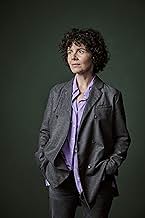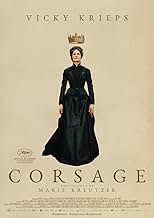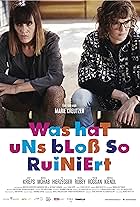A fictional account of one year in the life of Empress Elisabeth Of Austria. On Christmas Eve 1877, Elisabeth, once idolized for her beauty, turns 40 and is officially deemed an old woman; s... Read allA fictional account of one year in the life of Empress Elisabeth Of Austria. On Christmas Eve 1877, Elisabeth, once idolized for her beauty, turns 40 and is officially deemed an old woman; she starts trying to maintain her public image.A fictional account of one year in the life of Empress Elisabeth Of Austria. On Christmas Eve 1877, Elisabeth, once idolized for her beauty, turns 40 and is officially deemed an old woman; she starts trying to maintain her public image.
- Nominated for 1 BAFTA Award
- 17 wins & 44 nominations total
- Director
- Writer
- All cast & crew
- Production, box office & more at IMDbPro
Summary
Reviewers say 'Corsage' delves into Empress Elisabeth of Austria's conflict with societal norms and personal autonomy, emphasizing beauty, power, and gender limitations. Vicky Krieps' performance is lauded for its depth and complexity. However, the film faces criticism for its sluggish tempo, historical inaccuracies, and disjointed storyline. Some find the anachronistic aspects and historical deviations distracting. Despite these drawbacks, the film's cinematography, costume design, and Krieps' captivating performance are often noted as significant strengths.
Featured reviews
A beautifully shot and elegiac film that explores the life of Empress Elisabeth of Austria as she navigates the expectations of her culture and her own desires. Vicky Krieps gives a layered and nuanced performance as Elisabeth, and the metaphor of the corset effectively symbolizes the constrictions of her privileged but powerless life. While the film is unabashedly fictionalized, it effectively captures the internal struggles of a woman who is constantly told what to do and who grapples with the fear of losing her beauty and power as she ages. The sumptuous settings and contemporary songs add to the overall atmosphere of the film, which is both poignant and thought-provoking. Overall, "Corsage" is a worthwhile watch for fans of historical dramas and those interested in exploring themes of beauty, power, and the constraints of societal expectations.
The danger with fictional accounts of the lives of real people, is that it is frequently all to easy to poke holes in the plot. This is one such film that takes just a little too much creative licence with the the life of the Empress Elisabeth (Vicky Krieps). Wife of the famed Austro-Hungarian Emperor Franz Josef (Florian Teichtmeister), this film follows a supposed year in the life of this curious historical figure who, having suffered a family tragedy and having a rather estranged emotional relationship with her husband, spends much of her life obsessing with her weight and seeking solitude. Krieps is on good form, she creates a persona for her character that is effective to watch, but the mixture of modern and period scenarios (old buildings with modern fire doors; a cross-channel ferry!) seems anachronistic - to what end? The buildings in which she and her family inhabit have none of the opulence and grandeur of the Hofburg or Prague Castle, indeed the British home of her horse-master "Bay" (Colin Morgan) looks little better that a ramshackle ruin - and this is incongruous with the way we know she lived her life. Reclusive, yes, but still in splendour. It is also a particularly unremarkable year in her life to have chosen to illustrate. Not the previous ones where turbulence within the Imperial family reigned, not the famed "Mayerling" period which was ultimately held responsible for the final decline of this lady. There is also an highly speculative portrayal of her relationship with Bavaria's equally famous King Ludwig II (Manuel Rubey). The denouement itself is presented here in a rather too bizarre fashion that rather topped off this interesting but frankly flat and pace-less drama that offers us a glimpse of this intriguing woman, but little more of substance. Pity.
Vicky Krieps just might be the biggest name in European cinema right now: 2021 alone saw her star in six productions, under direction of everyone: from M. Night Shyamalan in Old (2021) to Mia Hansen-Løve in Bergman Island (2021) and Mathieu Amalric in Hold Me Tight (2021). Her performances have been consistently critically acclaimed, as is bound to be the case with Corsage.
Focussing on one year - 1878, we are reminded throughout the film - Corsage sets out to tell the story of Empress Elisabeth of Austria (1837-1898), known as Sissi, although the movie has no use for that nickname. The picture, written and directed by Austrian film-maker Marie Kreutzer, liberally blends fact and fiction: when asked how much of her work was faithful to history, Kreutzer said in an interview that she could not remember exactly. There are elements to the narrative (such as the ending) that are obvious inventions, while the rest is an amalgamation. The result is credible until it isn't; the background images being most at fault - who knew that electric floor lamps were so popular in the Kingdom of Bavaria. (Comparatively, the intentionally anachronistic music choices, like 'As Tears Go By' played on the harp, succeed in appearing an intrinsic part of the narrative.)
Corsage is very much a story of a person who sees herself as trapped while, possibly, enjoying the most freedom out of everyone we encounter. The visits Elizabeth pays to a psychiatric asylum and to see wounded, bed-ridden soldiers strike as performative, but the choice of her compassionate causes seems rooted in identifying her circumstances with theirs. Why, the empress cannot leave her position either - or can she?
Corsage is very successful in its depiction of a complex, not entirely sympathetic person. It is quite careless about the tools used to achieve that goal - yet, if you watch the film to its very last bit, the end credits include a scene of Vicky Krieps dancing in an empty gymnasium (the flaking paint is supposed to symbolise the decay of the monarchy). She is mesmerising. She is also wearing a false moustache, as a final reminder from Corsage to not take the production too literally.
Focussing on one year - 1878, we are reminded throughout the film - Corsage sets out to tell the story of Empress Elisabeth of Austria (1837-1898), known as Sissi, although the movie has no use for that nickname. The picture, written and directed by Austrian film-maker Marie Kreutzer, liberally blends fact and fiction: when asked how much of her work was faithful to history, Kreutzer said in an interview that she could not remember exactly. There are elements to the narrative (such as the ending) that are obvious inventions, while the rest is an amalgamation. The result is credible until it isn't; the background images being most at fault - who knew that electric floor lamps were so popular in the Kingdom of Bavaria. (Comparatively, the intentionally anachronistic music choices, like 'As Tears Go By' played on the harp, succeed in appearing an intrinsic part of the narrative.)
Corsage is very much a story of a person who sees herself as trapped while, possibly, enjoying the most freedom out of everyone we encounter. The visits Elizabeth pays to a psychiatric asylum and to see wounded, bed-ridden soldiers strike as performative, but the choice of her compassionate causes seems rooted in identifying her circumstances with theirs. Why, the empress cannot leave her position either - or can she?
Corsage is very successful in its depiction of a complex, not entirely sympathetic person. It is quite careless about the tools used to achieve that goal - yet, if you watch the film to its very last bit, the end credits include a scene of Vicky Krieps dancing in an empty gymnasium (the flaking paint is supposed to symbolise the decay of the monarchy). She is mesmerising. She is also wearing a false moustache, as a final reminder from Corsage to not take the production too literally.
Through ages and ages, women have been without power, even though it may seem she is an important figure but outside of her circle, she is to be used just for the apperance. Vicky Krieps is a delight. The women forced to oblige to the unrealistic standards of weight and beauty, not accepting the normal women. The things one woman has to do to get to this societal image and the toll on the mental health, even true today. You can feel the pain of all this in this film even though they had given her a bit of freedom of escaping (which I think is far from truth). Also, the hair styling was top notch, and I dont know why it reminded me of Sacrifice by Andrei Tarkovsky. Beautiful set design and dresses. Loved the use of lights and everything. But it is not only patriarchy that has engulfed the women throughtout this time. But all the things which benifit from them. I often wonder, what it would be like living in a eutopian world with no fallable systems created by humans.
There are several different ways to watch this movie.
You could analyze its historical accuracy, and you would find grounds for criticism.
You could be bothered by the fact that we're expected to sympathize with an empress, and you would find her personal struggles tiny, even pathetic, compared to the realities of her people.
But you could also decide to enjoy the acting, the script and the beautiful settings. And I did. The brilliantly understated acting by Vicky Krieps forms the core of this movie, and she is supported by great performances by almost the entire cast. All in all, writer/director Marie Kreutzer and the actors make this story believable, even surprisingly relatable.
You could analyze its historical accuracy, and you would find grounds for criticism.
You could be bothered by the fact that we're expected to sympathize with an empress, and you would find her personal struggles tiny, even pathetic, compared to the realities of her people.
But you could also decide to enjoy the acting, the script and the beautiful settings. And I did. The brilliantly understated acting by Vicky Krieps forms the core of this movie, and she is supported by great performances by almost the entire cast. All in all, writer/director Marie Kreutzer and the actors make this story believable, even surprisingly relatable.
Storyline
Did you know
- TriviaThe real Empress Elisabeth Of Austria refused all portraits or photographs after the age of 40 to maintain her youthful public image.
- GoofsFranz Joseph I of Austria never blamed his wife, the Empress Elisabeth of Austria, for the death of Archduchess Sophie of Austria. The criticism of Elisabeth's parenting came from her mother-in-law, Princess Sophie of Bavaria.
- How long is Corsage?Powered by Alexa
Details
- Release date
- Countries of origin
- Official sites
- Languages
- Also known as
- Corsage. La emperatriz rebelde
- Filming locations
- Production companies
- See more company credits at IMDbPro
Box office
- Budget
- €7,500,000 (estimated)
- Gross US & Canada
- $705,767
- Opening weekend US & Canada
- $32,285
- Dec 25, 2022
- Gross worldwide
- $3,110,623
- Runtime1 hour 54 minutes
- Color
- Aspect ratio
- 2.39 : 1
Contribute to this page
Suggest an edit or add missing content




































